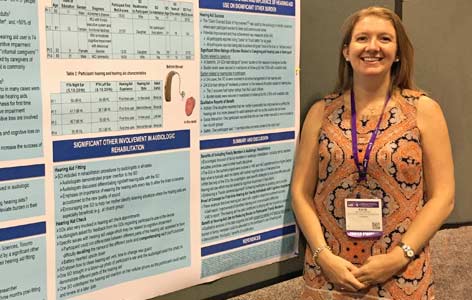Home page Description:
Alzheimer’s Association International Conference gives insight into latest in dementia care.
Posted On: September 23, 2016

Image Caption:
Conference attendee, Dr. Kate Dupuis, PDF
Supervisor: Dr. M. Kathleen Pichora-Fuller, TRI
Conference highlight: The highlight of 2016 Alzheimer's Association International Conference (AAIC2016) was the two-day Dementia Care Research and Practice Track, which featured the latest research and updates regarding innovations in dementia care practices.
The majority of caregivers for individuals with dementia are family members, often referred to as “informal caregivers”. Providing in-home care for an individual with dementia can be both physically and emotionally taxing. Indeed, family caregivers often report high levels of burden, which can in turn put them at increased risk for social isolation, depression, and dementia. The Dementia Care Research and Practice Track at AAIC2016 consisted of both oral sessions and poster presentations that described current practice and research related to caregiving for patients with dementia.
The presentations that were particularly relevant to the work being conducted by this postdoctoral fellow at Baycrest Health Sciences were those that described research projects focused on educating caregivers of individuals with dementia—specifically, providing education related to caregiving. In one particular study, led by Dr. Tan at UCLA, caregivers attended a one-day intensive training "Bootcamp" that was designed to improve patient safety and reduce caregiver burden. Researchers showed that program participants had increased feelings of perceived self-competence and self-reported knowledge of effective techniques to use in their caregiving activities. This type of educational program would be particularly relevant for caregivers of individuals with comorbid dementia and hearing loss who are seeking audiologic rehabilitation. Providing education related to the use and management of hearing aids, in addition to strategies for effective communication and caregiving, could increase the likelihood that the caregivers will derive secondary benefit from the provision of hearing aids to their care recipient with dementia. In addition, this type of training could increase the caregivers’ perceived self-competence in caring for the hearing aids, which may prolong their care recipients’ use of the device.
The majority of caregivers for individuals with dementia are family members, often referred to as “informal caregivers”. Providing in-home care for an individual with dementia can be both physically and emotionally taxing. Indeed, family caregivers often report high levels of burden, which can in turn put them at increased risk for social isolation, depression, and dementia. The Dementia Care Research and Practice Track at AAIC2016 consisted of both oral sessions and poster presentations that described current practice and research related to caregiving for patients with dementia.
The presentations that were particularly relevant to the work being conducted by this postdoctoral fellow at Baycrest Health Sciences were those that described research projects focused on educating caregivers of individuals with dementia—specifically, providing education related to caregiving. In one particular study, led by Dr. Tan at UCLA, caregivers attended a one-day intensive training "Bootcamp" that was designed to improve patient safety and reduce caregiver burden. Researchers showed that program participants had increased feelings of perceived self-competence and self-reported knowledge of effective techniques to use in their caregiving activities. This type of educational program would be particularly relevant for caregivers of individuals with comorbid dementia and hearing loss who are seeking audiologic rehabilitation. Providing education related to the use and management of hearing aids, in addition to strategies for effective communication and caregiving, could increase the likelihood that the caregivers will derive secondary benefit from the provision of hearing aids to their care recipient with dementia. In addition, this type of training could increase the caregivers’ perceived self-competence in caring for the hearing aids, which may prolong their care recipients’ use of the device.

